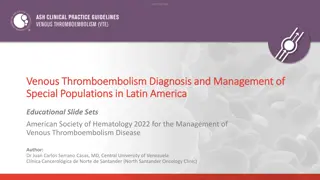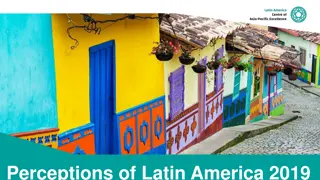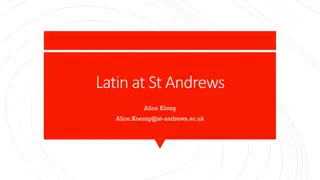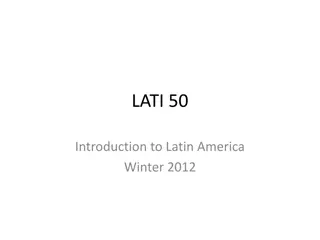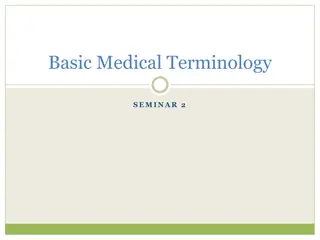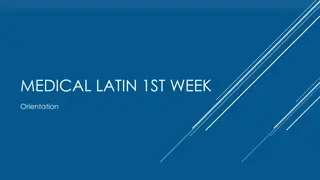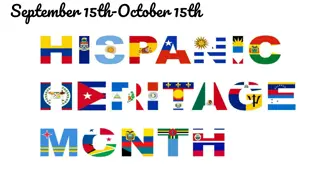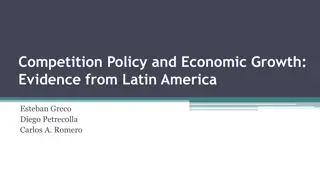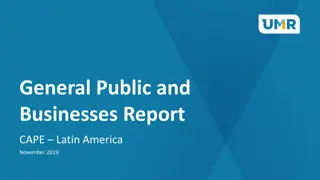Generative AI: What should governments in Latin America do?
Specific measures for governments in Latin America to navigate the complexities of generative AI, focusing on ongoing policy implementation, ethical considerations, regulatory experimentation, and key areas of work in the region.
7 views • 7 slides
Latin America Perspectives: History, Challenges, and Progress
Explore Latin America's rich history, conflicts, and environmental issues, along with the impact of Spanish and Portuguese influences. Delve into trade dynamics, poverty, and migration trends affecting the region. Learn about successful efforts to combat air pollution in Mexico City. Gain insights i
0 views • 22 slides
Standard of Living & Literacy Rate in Latin America
High literacy rates in Latin America positively influence the standard of living. Literate individuals can access better opportunities leading to economic prosperity and break the cycle of poverty.
0 views • 16 slides
Venous Thromboembolism Diagnosis and Management in Latin America: ASH 2022 Educational Slide Sets
The American Society of Hematology (ASH) 2022 guidelines for the diagnosis and management of venous thromboembolism in special populations in Latin America are presented in educational slide sets authored by Dr. Juan Carlos Serrano Casas and other experts. The Latin American ADOLOPMENT project, a co
0 views • 52 slides
Latin America Society of American Nuclear Society - Overview and Governance
The Latin American Section of the American Nuclear Society (LAS/ANS) was established in 1975 to represent nuclear professionals across Latin America. It focuses on promoting nuclear science and technology in various fields, facilitating research and education, organizing technical meetings, and fost
2 views • 43 slides
Overview of Antiarrhythmic Drugs Use and Classification
Antiarrhythmic drugs are classified into different classes based on their mechanisms of action. Class I includes sodium channel blockers with specific drugs like procainamide, disopyramide, and quinidine. Class 1B involves lidocaine and mexiletine. Class 1C consists of agents like flecainide. Class
2 views • 19 slides
Latin American Restaurant Port St Lucie
Welcome to The Chicken Place, your go-to destination for authentic Latin American Restaurant Port St Lucie. At The Chicken Place, we specialize in mouthwatering dishes featuring succulent grilled and roasted chicken, seasoned to perfection with our signature blend of spices. Visit \/\/kgschickenplac
1 views • 4 slides
Understanding the Importance of Prayer in Christianity
Explore the significance of prayer in Christianity, different ways of worshiping God, and the effectiveness of contemplation and meditation as forms of prayer. Understand prayer as a relationship with Jesus Christ, akin to a conversation between close friends. Reflect on the warmth, intimacy, and pe
0 views • 33 slides
Latin Words and Their Meanings in Images
Explore the beauty of Latin language through images depicting various words and their meanings, from expressions like "vultus" (face) to actions like "demitto" (to send down) and concepts like "novitas" (newness). Each image showcases a word and its English translation, providing a visual journey in
0 views • 40 slides
Economic Transformations in Latin America during the Late 19th Century
The late 19th century in Latin America marked a period of significant economic changes driven by a global context that included events like the Great Depression of 1873-1896 and the second industrial revolution. Core capitalist powers sought cheap raw materials, labor, and new markets, leading to in
1 views • 17 slides
Introduction to Pig Latin for Data Processing in Hadoop Stack
Pig Latin is a dataflow language and execution system that simplifies composing workflows of multiple Map-Reduce jobs. This system allows chaining together multiple Map-Reduce runs with compact statements akin to SQL, optimizing the order of operations for efficiency. Alongside Pig Latin, the Hadoop
0 views • 20 slides
Understanding Latin Syllables and Vowel Length Rules
Learn about the division of Latin words into syllables based on vowels, the rules for accent positions, distinguishing long and short vowels through special marks, and recognizing syllables that are always long or short. Explore how Latin vowels are categorized by nature and marked in dictionaries t
0 views • 24 slides
NTAs and Public Policy in Latin America and the Caribbean
ECLAC's mission is to promote sustainable development in Latin America and the Caribbean through comprehensive analysis, policy formulation, and international cooperation. The Latin American and Caribbean Centre for Demography has been actively involved in NTA-related projects to address issues such
0 views • 10 slides
Integrated Drought Risk Management in Latin America and the Caribbean
Managing water resources in arid and semi-arid regions of Latin America and the Caribbean involves addressing climate risks through integrated drought risk management. Tools such as National Drought Observatories, Latin American Flood and Drought Monitor, and the Latin American Drought Atlas aid in
0 views • 14 slides
Headless vs. Headed Relative Clauses in Latin: A Comparative Study
This study delves into the complexities of headless and headed relative clauses in Latin, exploring their syntax, semantics, and functions. Through analyzing examples from ancient texts, the research sheds light on the distinct characteristics and uses of these structures in the evolution of Latin g
0 views • 62 slides
Challenges and Opportunities for Youth in Latin America and the Caribbean
The focus on youth in Latin America and the Caribbean is crucial due to the demographic window of opportunity that is still open. Despite being more educated and belonging to the middle class, young people face limited opportunities, leading to challenges in employment prospects. Gender gaps persist
0 views • 31 slides
Perceptions of Latin America 2019 - Insights from New Zealand
This study delves into the perceptions of Latin America among the general public and businesses in New Zealand. It includes insights on the importance of Latin America to New Zealand, awareness of its politics, economics, and culture, knowledge sources, personal experiences, language study views, an
2 views • 12 slides
How to Work Through a Latin Sentence: A Step-by-Step Guide
Reading Latin sentences requires a specific approach to connect the words with their functions and translations. By following a methodical process, beginners can gradually understand the structure and meaning behind Latin sentences. Starting from left to right and correlating Latin case endings with
0 views • 7 slides
Learning Latin Grammar: Vocabulary and Verb Conjugation
Explore Latin vocabulary words and grammar concepts such as personal pronouns, present tense verbs, and imperfect tense conjugations. Practice forming sentences and conjugating verbs in the Latin language using engaging visual aids and examples.
1 views • 60 slides
Latin Language Learning and Research at St. Andrews
St. Andrews offers Latin courses for beginners to advanced levels, utilizing immersive experiences and spoken Latin to support diverse student needs. The curriculum includes intensive classes, diagnostic tests, and a focus on non-canonical Latin works. The program progresses to honours-level researc
2 views • 7 slides
Nationalist Revolutions in Latin America: 1789-1900
Rising nationalism in Latin America during the late 1700s and early 1800s led to revolutions against European colonial powers. Inspired by Enlightenment ideals and events such as the American and French Revolutions, Latin Americans sought self-government and independence. The Haitian Revolution in 1
1 views • 28 slides
Understanding Latin Noun Cases and Declensions
Explore the use and distinctions of Latin noun cases (Nominative, Genitive, Dative, Accusative, Ablative), along with the concept of declensions, genders, numbers, and cases. Learn how to determine the declension, gender, number, and case of a Latin noun through its endings, and delve into examples
0 views • 23 slides
Exploring the Diversity of Latin Words and Meanings
Delve into the intriguing world of Latin vocabulary with a variety of words ranging from expressions of love and care to terms related to accuracy, assurance, and fluidity. Discover the richness of Latin language through images representing concepts like affection, consideration, obtaining, finishin
0 views • 28 slides
Exploring Latin America: A Cultural Journey Through History and Society
Delve into the rich tapestry of Latin America through the course "Introduction to Latin America" in Winter 2012. The course covers various dimensions from magical realism to economic development, democracy to dictatorship, social inequality to popular culture. Engage with the paradoxes of this vibra
0 views • 10 slides
Achieving Universal Health Coverage: Insights from Latin America
The Lancet Series on Universal Health Coverage in Latin America explores the importance of the Latin American nations' experience in the global context, addressing profound inequalities, policy experimentation, and the quest for Universal Health Coverage. The series delves into political and technic
0 views • 15 slides
Latin Week Review & Test Schedule
Stay updated with this Latin Week review and test schedule, including reminders, conjugation practice, vocabulary study, and test preparation to excel in your Latin studies.
0 views • 32 slides
Latin Class Schedule and Assignments
Latin class activities and assignments for the week include conjugating verbs, translating texts, practicing vocabularies, and preparing for a test. The schedule covers various linguistic exercises and assessments to enhance Latin language skills.
0 views • 29 slides
Influence of African Slavery on Latin America's Development
African slavery played a significant role in the development of the Americas, particularly in Latin America. The transatlantic slave trade brought millions of Africans to the Americas to work in plantations, mines, and other industries. The triangular trade route facilitated the exchange of slaves f
0 views • 9 slides
Advancing Open Science Initiatives in Latin America: CLACSO's Contributions and Challenges
Latin America is at the forefront of championing open access and open science initiatives, with CLACSO leading the way. By prioritizing community-owned infrastructures and advocating for international cooperation, CLACSO aims to tackle underfunding issues and promote equitable recognition for resear
0 views • 20 slides
Medical Terminology Seminar 2: Pronunciation Practice and Latin Declensions
Join our Medical Terminology Seminar 2 to practice pronouncing challenging medical terms like Infarctus myocardii recens and learn about Latin declensions to identify noun stems. Explore the genitive endings of Latin declensions and practice giving declensions of various body part nouns. Enhance you
0 views • 27 slides
Introduction to Medical Latin Course at University of Debrecen
Explore the Medical Latin 1st Week Orientation at the University of Debrecen, focusing on basics of medical terminology, attendance requirements, test details, and topics covered throughout the course. The course includes word quizzes, tests, and a comprehensive study of medical terminology, anatomy
0 views • 26 slides
Exploring Latin Literary Devices Through Examples
Uncover the beauty of Latin literary devices through vivid examples such as alliteration, anaphora, allusion, and more. Dive into the world of Latin literature and enhance your understanding of these powerful techniques.
0 views • 31 slides
Celebrating Hispanic & Latin Heritage: Stories of Impactful Individuals
Explore the significance of Hispanic & Latin heritage, learn the distinctions between Hispanic and Latin American, and discover inspiring figures like Sylvia Acevedo, Dr. Alfredo Quiñones-Hinojosa, Laurie Hernandez, and Omar Gonzalez who have made remarkable contributions in various fields.
0 views • 13 slides
Understanding Latin Infinitives: A Beginner's Guide
Discover the essence of Latin infinitives and how to interpret them. Learn about their structure, conjugations, and various uses, including as subjects in sentences. Dive into examples and grasp the significance of identifying infinitives in Latin verbs. Unravel the mysteries of tense and complement
0 views • 9 slides
Competition Policy and Economic Growth in Latin America
This study explores the relationship between competition policy and economic growth in Latin America, comparing indicators such as local competition intensity and effectiveness of antimonopoly policy across various countries. The findings suggest that Latin American countries lag behind developed na
0 views • 11 slides
Understanding Social Class in Sociology
Social class, also known as class, refers to a group of individuals in a society who share similar socioeconomic status. The concept of class plays a crucial role in social theory, influencing social mobility and census data. From early theories by political philosophers like Hobbes to Marx's influe
0 views • 17 slides
Latin Verbs Explained Through Images
Explore and understand Latin verbs such as "exuviae", "sino", "exsolvo", and more through visually engaging images and detailed descriptions. Improve your vocabulary and comprehension of Latin language with this interactive resource.
0 views • 38 slides
CAPE Latin America General Public and Businesses Report November 2019
The CAPE Latin America report delves into public and business perceptions of the region through surveys conducted in November 2019. It explores topics such as awareness, knowledge sources, visitation experiences, and business success. The research objectives outline the need to understand public per
0 views • 72 slides
Latin Verbs and Adjectives Illustrated
Captivating images illustrating Latin verbs and adjectives with their meanings, from being dazed and standing agape to breathing out, deserting, plundering, and more. Each image showcases the essence of the Latin term in a visually appealing manner, aiding in better understanding and retention of vo
0 views • 50 slides
Lessons on Capital Account Liberalization in Latin America: A Historical Overview
Explore the evolution of capital account liberalization in Latin America from 1950 to 2013, highlighting key events such as the Latin American debt crisis, post-crisis capital flows, and regulatory phases. The comparison with emerging market economies sheds light on the region's capital account rest
0 views • 11 slides



